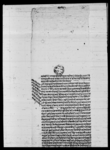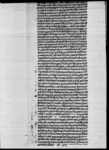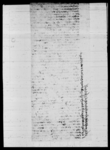A lālamohara from King Surendra acknowledging Rūpalāl Das as mahanta of Basahiyā Maṭh (VS 1927)
ID: DNA_0012_0001
Edited and
translated by Rajan Khatiwoda
in collaboration with
Ramhari Timalsina
Created: 2016-10-22;
Last modified: 2017-02-07
For the metadata of the document, click here
The accompanying edition, translation/synopsis and/or commentary are available under the terms of the Creative Commons Attribution-ShareAlike 4.0 International License
Abstract
This lālmohar of King Surendra calls upon Rūpalāl Das of Basahiyā Maṭh, Mahottari to enjoy the post of mahanta and directs him to identify Rāmdās to be his succesor.Diplomatic edition
[1r-pt.1]
श्रीदुर्गाज्यूश्रीमदतिप्रचण्डभुजदण्डेत्यादिश्रीश्रीश्रीमहाराजजङ्गबहादुरराणाजीसी.बी.प्राइममिनिष्टरयाण्डकम्याण्डरइनचिफ१[royal seal]1स्वस्तिश्रीगिरिराजचक्रचूडामणिनरनारायणेत्यादिविविधविरुदावलीवि2राजमानमानोन्नतश्रीमन्महारजधिराजश्रीश्रीश्रीमहाराजसुरेन्द्रविक्रमसाह
3वहादूरसम्सेरजङ्गदेवानांसदासमरविजयिनाम्¯¯¯¯¯¯¯¯¯¯¯¯¯¯¯
4आगेजिल्लैमहुत्तरिवसहियामठकामहन्तरुपलालदासके•मेरागुरुमोहन्दास
5लेमलाईमहन्त्याञीकोतिलककंठिभलामिनिसस्मेत्राषीदिजानुभयाकोहो
6सोमहन्त्याञीमैले२०सालमाचलायाकोथिञा२१सालमाअघिभयाकोवेहोरा
7दवाइमहन्त्याञीमलाईदिजानुभयाकोहोभनिकासिदासलेझुटोविन्तिपा
8रिरुक्कादस्षत्गराईल्याईमेरोमहन्त्याञीजान्याहोईनभनीवालादासलेवा
9दिइजहारदिय़ारमेरागुरुमोहनदासले•मलाईमहन्त्याञीदिदा•मैलेरुपै
10य़ास्मेत्राष्याकोथिञारनिजगुरुश्वर्गेहुँदापनिनीजवालादासस्मेत्जना•
11४लेमहन्त्याञीकोकागजमलाइलेषीदिंदामैलेनीजगुरुकोकाजक्रीयास
12मेत्गरिमहन्त्याञीचलाइआयाकोमावालादासलेजवरदस्तिगरिमहन्त्या
13ञीचलाउदामैले---१---काहजुरमाविन्तीपारिभयाभरकावेहोराको
14रुक्कादस्षत्गराईलग्याकोहो•झुठोविन्तीपारिलग्याकोहोईनभनिजिल्लै
15महुत्तरिवसहीय़ाकामहन्तकासिदासलेप्रतिवादीइजहारदियाकामुद्दामा
16इजहारप्रमाणअडालेविचारगर्याकोऐनसव़ालकारुहले•येस्मुद्दामागुरु
17मोहनदासछँदैजलेश्वरभारिकचहरिमाअफीसरपगरिहरुराषी•कासि
18दासलाइमहन्त्याञीतलाईभय़ोभन्दारुपैय़ास्मेत्राषीमहन्त्याञीपाय़ा
19काहुंताहापछिनिजमोहन्दासषस्दा•निजवालादास्•सुषरामदास्•रामजिवन्दा
20स्•प्राणदास्स्मेत्वसि•गोपालझा१रामवक्तकोइर१भुवनमंडर१येतिजना
21साछीराषी•अघीगुरुलेपनी•इनैकासिदासलाइदियाकोहोआजपनीहामी
22४भाइले•इनैकासिदासलाइमहन्त्याञीथामीदिनुभन्न्यामुद्दाको२०साल
23माघशुदी१४रोजकादीनकागतलेषीदीयाको•कागजनीजवालादासलेकि
24र्त्याभन्दा•सोहीकागजमालेषीय़ाकासाछीस्मेत्रुक्कादस्षत्गरिझिकाइ•जे
25ठा सुषरामदासर•इनैमाथीलेषीय़ाकासाछीजना३लेयोकागजकीर्त्याहोई
26न•सद्देहो•येस्माश्रेस्तालेभाक्नपर्याभाक्छौंभंन्यामुद्दाकोवक्पत्रलेषी
27दियापछिअदालतवन्दोवस्तका५६लंवरकाऐनमोतावीकरोजरोजहाजीरभ
28
[1r-pt.2]
ये़नौर•१५दिनसम्मगैरपर्यौभन्या•परिबन्धलेमेरोजीतहुन्याभय़ापनी•मेरो29हारगरि•मेरोझगडीय़ाकोजीतगरिदीनुभंन्यामुचुल्का२३सालमार्गशुदी
30१४ । १५रोजकादीनलेषी९दीनसम्मकचहरिमासामेलभै•१०दीनदेषीभा
31गीगय़ाकोआजसम्मकचहरिमासामेलहुननआय़ापछी•महन्त्याञीका
32सिदासकोचेला•रामदास्लाइदीनु•आफुलेनपाउन्यामहन्त्याञी•मपाउन्या
33हुँभनीसमाय़ावावत्•वालादासभाग्याकोहुनाले•नीजअदालतवन्दोवस्तका
34५६लंवरकाऐनलेजायेदात्गर्नलाइ•घरद्वारकेहीनहुँदा•नीजवाला
35दास्फेलापर्याकादीन•ज्मानवन्दीलेषाईगुठीका३४लंवरकाऐनलेसो
36हीमठ्काजगाकोतलसींवोटीकंपनीरुपैय़ा३०००डंडगरि•तिर्यारुपैयाली
37नतिर्याकैदगरि•कैदपुग्यापछीछोडीदिनु•महन्त्याञीमठ्जित्यावावत्•रा
38मदास्वाटफुट्करगुठीकोजगाकाऐनलेडंडकोचौथाइ७५०जिताउरिली
39नीजरामदास्लाइ•जगाकोवहालीचलाइदी•जितापत्रकोरुक्कादस्षत्हुँदा
40येसमुद्दाकोजितापत्रगर्दा•तोक्माइजहारकारुहलेतोक्लेषीय़ोतापनी•
41रामदास्लेआफ्नाघरायेस्मामिल्यामाफीक्•कागजपत्रगरि•राजीनामाले
42षीदीँदा•घरायस्मामील्यावमोजीमकोवेहोरास्मेत्हाली•नीजरुपलाल
43दासकानाउमारुक्कादस्षत्कोजितापत्रगरिझगडाछिनीदीन्याठहराइजंगी
44अदालत्१लंवरकाडिट्ठाछन्दलालबुर्लाकोटीविचारिकपीलमुनीपाध्या
45ले२३सालमीतीमाघवदी२रोज२मा•साधक्कौसल्माजाहेरगराउदा
46कौसलवाटजाँचीवुझी•अडालेठहराइल्याय़ावमोजीम्मुनासिवठहरा
47इसाधक्हाल्दाजाहेरभय़ोतसर्थ•सोसाधक्माहुकुम्मर्जीकोसदरग
48रिवक्स्यावमोजीम्•आफुलेनपाउन्याजील्लैमहुत्तरिवसहीयाकोमहन्त्या
49ञीमठमपाउन्याहुँभनीवालादास्लेइजहारचह्राइमहन्तकासिदास्
50सँगपुर्पक्षेहुँदैमा•निजमहन्तमर्दा•नीजमहन्तकाचेलारामदासले•रनी
51जवालादासले•अदालतवन्दोवस्तका५६लंवरऐनमोतावीक्•रोजरो
52जहाजीरभये़नौंर१५दीनसम्मगैरपर्यौंभन्या•जीतहुन्याभय़ापनीहारग
53रि•झगडीय़ाकोजीतगरिदीनुभंन्यामुचुल्कालेषी९दीनसम्महाजीरभै•
54दसौंदीनदेषीभागीजाँदा•नीजवालादास्लाइ•गुठीका३४लंवरकाऐ
55नले•वालादास्फेलापर्याकादीनज्मानवन्दीलेषाइतल्सींवोटी३हजा
56रडंडगरि•तिर्यारुपैय़ालीनतीर्याकैदगरिकैदपुग्यापछीछाडीदीन्या
57छन्•महन्त्याञीमठ्जीत्यावावत्•फुट्करगुठीजगाकाऐनले•रामदाससँग
58जिताउरिकम्पनीरुपैय़ा७५०ली•नीजरामदासकानाउमा•जितापत्रहुनुप
59र्न्याहोतापनी•आफ्नाज्यूताभरमहन्त्याञीचलाउनुअरुचेलानतुल्याउ
60नु•कारोवारिमैलेहुनुतिम्रासेषपछीय़ोमहन्त्याञीमैलेचलाउनुभंन्या
61वेहोराकोतिम्रागुरुभाइरामदास्लेघरायेस्माराजीनामालेषी•तिमीलाईछा
62डीदीय़ाकाहुनाले•सोवमोजीम्•तिम्राजिउताभरनीजमठ्कोमहन्त्याञी
63चलाइ•रामदासलाइकारोवारितुल्याइचलाइ•महन्तमोहन्दास्लेचर्चिआय़ाव
64मोजीम्आफ्नाषातीरजामासँग•महन्त्याञीजानी•नीजवसहीय़ामठ्
65कोचलन्गर्नु•अरुचेलानतुल्याउनु•तिम्रासेषपछीनीजरामदासलेमहन्त्या
66ञीहुनुभनीजितापत्रकोरुक्कादस्षत्गरिवक्स्यौँभंन्यावेहोराको२३सा
67लफागुनवदी१३रोज१मा•मेरानाउँमारुक्कादस्षत्भै•महन्त्याञीचलन्
68गर्याकोहोलालमोहरभय़ाकोछैनभनीतीमीले---१--काहजुरमाविन्ती
69गर्याकोवीस्तारनीज---१---रश्रीमद्राजकुमारकुमारात्मजश्रीकम्यान्ड
70रइनचिफ्जनरलरणउद्दीपसींहकुव़रराणावाटहाम्राहजुरमाविन्तीपा
71र्दाजाहेरभय़ोतसर्थ•सोजीतापत्रवमोजीम्•तिम्राज्यूताभरनिजमठ्कोमहन्त्याञी
72चलाइ•रामदासलाइकरोवारितुल्याइमहन्तमोहन्दास्ले•चर्चीआय़ा
73वमोजीम्•नीजवसहीय़ामठ्अस्थानकातालुक्कोजगाभोगचलन्गर्नु
74अरुचेलानतुल्याउनु•तिम्रासेषपछीनीजरामदासलेमहन्त्याञीहुनुभनी
75हामीवाटपनीतीमीलाईनीजवसहीय़ामठ्अस्थानका•महन्त्याञीकोला
76लमोहरगरिवक्स्यौं•अस्थानमाअघीदेषीदरिचलीआय़ावमोजीमका
77नित्त्यनैमीत्त्यकपर्वपर्वकापुजारधर्मसदावर्तचलाइहाम्रोजय़मना
78ई•आफ्नाषातिरजामासँगमहन्त्याञीजानीभोग्यगर•इतिसम्वत्१९
79२७सालमीतीचैत्रवदी...रोज...शुभम्¯¯¯¯¯¯¯¯¯¯¯¯¯¯¯¯¯¯
[1v]
1मार्फत्श्री३माहाराजजंगवाहादुरराणा•जिःसिःविप्राइममिनिष्टरयान्डकम्याडरइनचीफ्2हजूर्माकम्यांडरइनचीफ्जनरलरणउद्दीपसिंहराणाः\
Translation
[1r-pt.1]
Venerable Durgā!
Thrice Venerable Mahārāja Jaṅga Bahādura Rāṇā G.C.B., Prime Minister and Commander-in-Chief, [he who holds] a formidable club in the form of his arms 1
Hail! [A decree] of him who is shining with manifold rows of eulogy [such as] ‘The venerable crest-jewel of the multitude of mountain kings’ and Naranārāyaṇa (an epithet of Kṛṣṇa) etc., high in honour, the venerable supreme king of great kings, the thrice venerable great king, Surendra Vikrama Sāha, the brave swordsman, the divine king always triumphant in war.
To Mahanta Rupalāladāsa, head of Vasahiyā monastery in Mahuttari District
Bālādāsa filed a lawsuit, stating: “My teacher Mohanadāsa conferred upon me the office of mahanta, placing as he did a mahanta’s tilak and kaṇṭhī [on me] and noble men (i.e. the monks) [under me]. I ran [the monastery] as its head till the year [VS 19]20. In the year [VS 19]21 Kāsidāsa made false petition, suppressing previous details and had a rukkā issued that stated: ‘[Mohanadāsa] granted [the office] of mahanta to me’. [Thus] my [claim to] the office of mahanta is not to be dismissed.”
Kāsidāsa, head of Vasahīyā monastery in Mahuttari District, filed a lawsuit as a respondent, as follows: “When my teacher Mohanadāsa granted me the office of head of the monastery, I even gave the money [that is the customary gift]. After my teacher died, four of my teacher’s disciples including Bālādāsa signed a document giving their consent to grant me the office of head of the monastery, but when I [started] occupying the office of head of the monastery, including performing the funerary rites of my teacher, Bālādāsa forcibly seized my office. Therefore, I made petition to ---1--- with all the details and had a rukkā issued, and I did not make petition under false pretences. Regarding the lawsuit [filed by me] as a respondent, it was determined by the Jaleśvara court, after calling officers and [other] authorities (pagari) as witnesses, that when the teacher Mohanadāsa was still alive the office of head of the monastery had been granted to me. I obtained the office of head of the monastery, giving the money [that is the customary gift]. Thereafter, when [my] teacher Mohanadāsa died, Bālādāsa, Sukharāmadāsa, Rāmajīvanadāsa and Prāṇadāsa signed a document [drawn up by the court] regarding my lawsuit on the 14th of the bright fortnight of Māgha in the year [VS 19]20 [and] witnessed by Gopāla Jhā, Rāmavakta Koi and Bhuvana Maṃḍara, stating: “The office of head of the monastery was earlier granted to Kāsidāsa by our teacher; thus today, too, we four agree to grant it to Kāsidāsa.” [However], Bālādāsa claimed that the mentioned document [presented by Kāsidāsa] was forged. When the witnesses to the above document were brought [to court] after a rukkā was issued [summoning them], Sukharāmadāsa (the eldest disciple [of Mohanadāsa]) and the three above-mentioned witnesses gave a written statement to the effect that the document was not forged but is genuine, and that if necessary they were ready to swear solemnly [to that effect]. Thus the court made the following decision in that lawsuit: “Bālādasa agreed to follow [a provision of] the Ain, writing a statement on the 14th and 15th of the bright fortnight of Mārga in the year [VS 19]23 year, as follows:
[1r-pt.2]
‘If we are unable to present ourselves in court on a daily basis and are [still] absent up to the 15th day, then in accordance with section 56 ‘On Court Procedures’, the court shall deem the party opposing me the winner of the lawsuit and me the loser, even if there is the possibility that I would have won the case.’ He presented himself in court for the first 9 days. From the 10th day he remained absent and has never come back to court. Therefore, the office of head of the monastery shall be granted to Rāmadāsa, a disciple of [the late] Kāsidāsa. Since Bālādāsa has no house or property to confiscate in accordance with section 56 ‘On Court Procedures’ for having falsely claimed the office of head of the monastery, he shall be made to write a confession of guilt (jabānabandī) and fined 3,000 Company rupees in accordance with section 34 ‘On Gūṭhī Endowments’ when he is found. If the fine is not paid, he shall be imprisoned. After his prison term is over, he shall be set free. [One] shall take 750 Company rupees, one fourth of the fine, as the victor’s fee, from Rāmadāsa in accordance with miscellaneous articles on the law relating to ‘Guṭhī Land’.”Rāmadāsa was granted the land and a rukkā certifying his victory was issued to him, but he signed on household paper his resignation from the office of head of the monastery and made an agreement with Rūpalāladāsa, giving this office to the latter. Therefore, Ḍiṭṭhā Chandalāla Burlākoṭī and Vicārī Kapīla Munī Pādhyā of Army Court No. 1 came to the decision that it would be appropriate to dissolve the lawsuit by issuing a rukkā under the name of Rupalāladāsa to certify his victory. They forwarded the decision to the Council on Monday, the 2nd of the dark fortnight of Māgha in the year [VS 19]23.
The Council investigated, deemed the decision of the lower court appropriate and forwarded it [higher up] for review. The Council’s decision was endorsed. When the court proceedings were going on regarding the lawsuit filed by Bālādāsa against Kāsidāsa in order to obtain the office of head of Vasahiyā monastery in Mahuttari District, which Bāladāsa would [in the end] not obtain, the head of the monastery, Kāsidāsa, died. Rāmadāsa (a disciple of Kāsidāsa) and Bālādāsa signed a document in accordance with section 56 on ‘Court Procedures’ stating that in the case where [either of the two] did not present himself in the court on a daily basis and remained absent for 15 days, the one who was absent would concede defeat and acknowledge the other as victor in the case, even if he [himself] had been likely to win the case. After that agreement, Bālādāsa presented himself in the court for the first 9 days. On the 10th day he fled. Therefore, Bālādāsa shall be fined 3,000 Company rupees in accordance with section 34 on ‘Guṭhī Endowments’ when found. If he does not pay that fine, he shall be imprisoned; when the prison term is over, he shall be set free. Rāmadāsa shall be made to pay 750 company rupees as a victor’s fee in accordance with the miscellaneous Ain on ‘Guṭhī Land’. Thereupon a favourable written judgement is to be issued under Rāmadāsa's name. Your (i.e., Rūpalāladāsa's) classmate (gurubhāi) Rāmadāsa signed a waiver stating: “You (i.e., Rūpalāladāsa) shall occupy the office of head of the monastery as long as you live, but you shall not have any disciple, while I shall manage [the monastery’s] secular affairs. I (i.e., Rāmadāsa) will assume the office of head of the monastery after your death.”
It came to be known to us through ---1--- (i.e., Prime Minister Jaṅga Bahādura Rāṇā) and the venerable Commander-in-Chief General Raṇa Uddīpa Siṃha, a prince born of a prince, that you made a petition stating: “A rukkā but not a lālamohara was issued under my name on Sunday, the 13th dark fortnight of Phāguna in the year [VS 19]23 stating: ‘You (i.e., Rūpalāladāsa) shall make Rāmadāsa the [executive] manager of the monastery and enjoy the office of head of it as Mohanadāsa did. You shall not have any disciple. Rāmadāsa shall be the head of the monastery after your death’.”
Therefore we, too, hereby issue a lālamohara to you regarding the office of head of Vasahīyā monastery, [with the following details]: “In accordance with the details written down in the favourable judgement, you (i.e., Rūpalāladāsa) shall make Rāmadāsa the [executive] manager of the monastery and enjoy the office of head of it as long as you live, as Mohanadāsa did. You shall also enjoy the detached land possessed by Vasahīyā monastery, but you shall not have any disciple. Rāmadāsa shall be head of the monastery after your death. You shall continue on with the daily and casual worship, rituals, festivals and dharmasadāvartta as they have been fixed and passed down by tradition. Celebrate our victories and enjoy the office of head the monastery.
On (...), the (...) dark fortnight of Caitra in the year [VS 19]27. Auspiciousness.
[1v]
Forwarded by Commander-in-Chief General Raṇa Uddīpa Siṃha Rāṇā to the Thrice Venerable Great King, Prime Minister and Commander-in-Chief Jaṅga Bahādura Rāṇā G.C.B.



